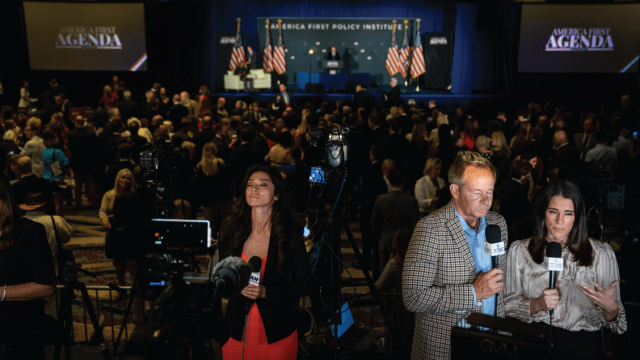
Most Americans say it is not important that the news they get comes from journalists who share their political views, age, gender or other traits. But people are more likely to say it is important for journalists to share their politics than any other characteristic we asked about. And certain demographic groups place more value than others on the personal traits of their journalists.
A 2023 Pew Research Center survey asked Americans how important it is for the journalists they get news from to have six personal characteristics that are similar to their own.
Pew Research Center conducted this analysis as part of a broader look at Americans’ views of the news media. The data for this analysis comes from a survey of 10,701 U.S. adults from March 13 to 19, 2023.
Everyone who completed the survey is a member of the Center’s American Trends Panel (ATP), an online survey panel that is recruited through national, random sampling of residential addresses. This way nearly all U.S. adults have a chance of selection. The survey is weighted to be representative of the U.S. adult population by gender, race, ethnicity, partisan affiliation, education and other categories. Read more about the ATP’s methodology.
Here are the questions used for this analysis, along with responses, and the survey methodology.
Pew Research Center is a subsidiary of The Pew Charitable Trusts, its primary funder. This is the latest analysis in Pew Research Center’s ongoing investigation of the state of news, information and journalism in the digital age, a research program funded by The Pew Charitable Trusts, with generous support from the John S. and James L. Knight Foundation.
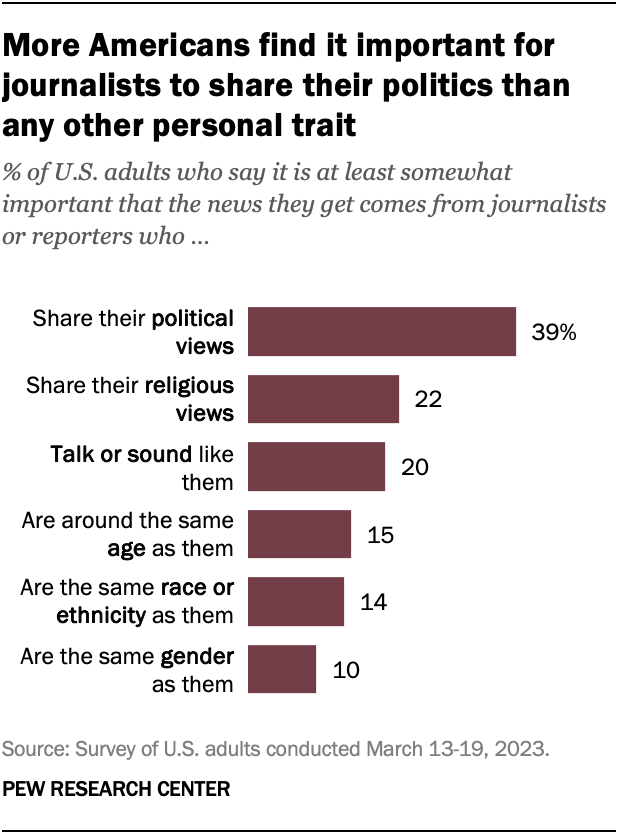
About four-in-ten Americans say it is at least somewhat important that they get news from journalists who share their political views (39%). That is nearly double the share who say the same about getting news from journalists who share their religious views (22%) or who talk or sound like them (20%).
Smaller shares say they want to get news from journalists who are similar to them in age (15%), share their race or ethnicity (14%), or share their gender (10%).
On several of these questions, opinions vary based on respondents’ political views, age and other personal traits.
Political views
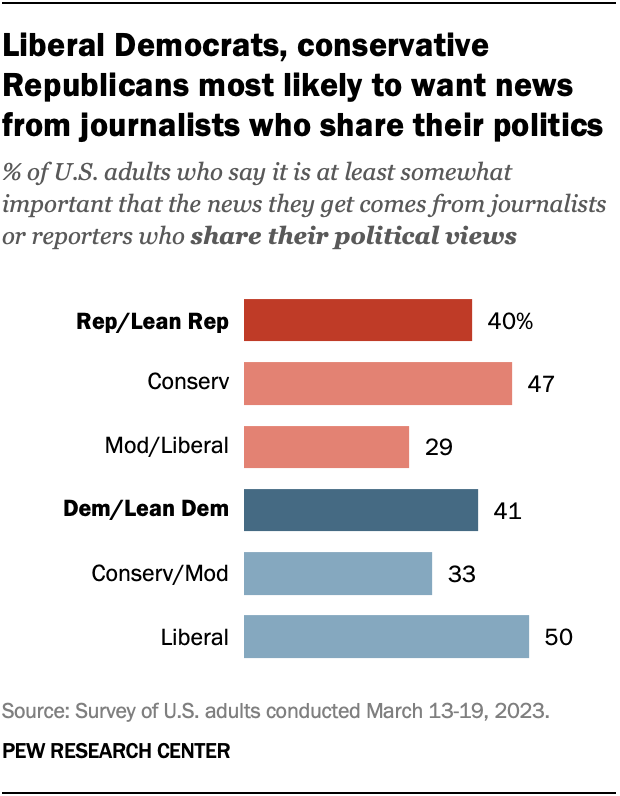
Similar shares of Republicans and Democrats say it is at least somewhat important for the news they get to come from journalists who share their political views. Four-in-ten Republicans and GOP-leaning independents say this, compared with 41% of Democrats and Democratic leaners.
When combining party and ideology, people who place themselves at either end of the political spectrum are more likely than those toward the center to say journalists’ politics are important.
- Roughly half each of conservative Republicans (47%) and liberal Democrats (50%) say it is important that the news they get comes from journalists who share their politics.
- Smaller shares of liberal and moderate Republicans (29%) and conservative and moderate Democrats (33%) hold this view.
Age
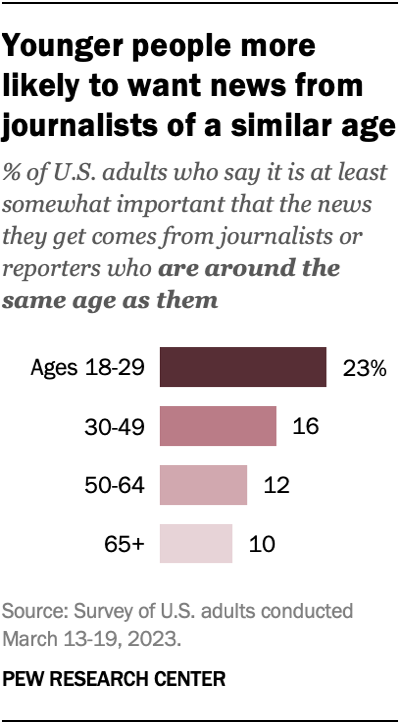
Younger adults are more likely than older Americans to say they want news from journalists who are around the same age as them. Among U.S. adults ages 18 to 29, 23% say this is at least somewhat important, compared with one-in-ten of those ages 65 and older.
Younger adults are also more likely than older adults to say it’s important that the journalists they get news from are the same gender as them; still, large majorities say this is not important. Some 16% of those ages 18 to 29 say it is at least somewhat important for journalists to share their gender, versus 6% of those 65 and older.
Race or ethnicity
Black Americans are more likely than other racial or ethnic groups to say it is important they get news from journalists who share several of their characteristics – particularly their race or ethnicity.
About four-in-ten Black Americans (41%) say it is at least somewhat important that the news they get comes from journalists who share their race or ethnicity. A quarter of Hispanic Americans, 20% of Asian Americans and just 5% of White Americans say the same.
For more information on how Black Americans answered these questions, read our report on Black Americans and news.
Religion
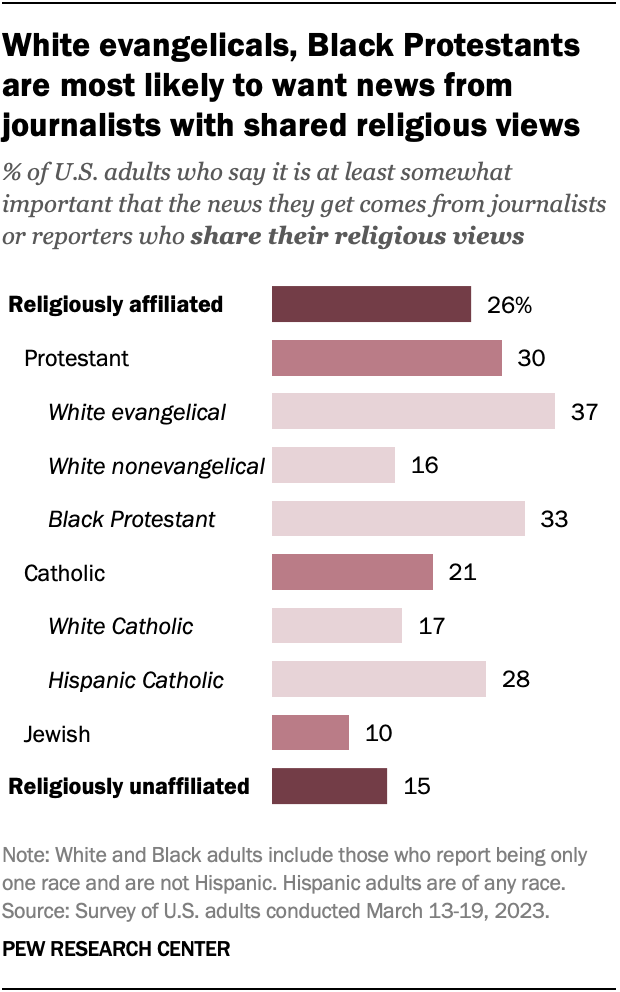
Overall, Americans who identify with a religion are more likely than those who are religiously unaffiliated to find it at least somewhat important to get news from journalists who share their religious views (26% vs. 15%).
Among Christians, Protestants are more likely than Catholics to say it is important for journalists to share their religious views (30% vs. 21%). But there are also differences among Protestants and among Catholics:
- White evangelical Protestants (37%) and Black Protestants (33%) are about twice as likely as White nonevangelical Protestants (16%) to say this.
- About three-in-ten Hispanic Catholics say this (28%), compared with 17% of White Catholics.
Among Jewish Americans, just 10% say it’s at least somewhat important to get news from journalists who share their religious views.
Note: Here are the questions used for this analysis, along with responses, and the survey methodology.
